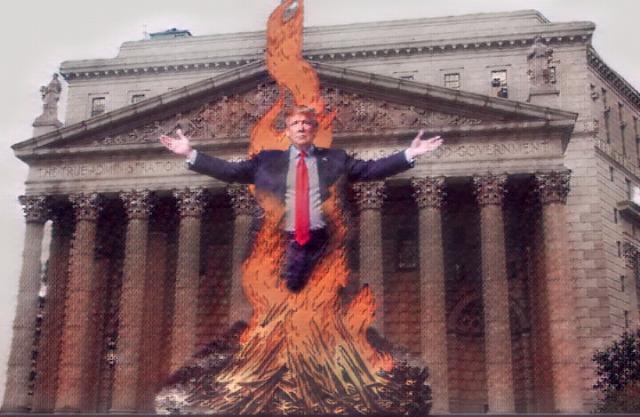The trouble with Trump’s jurors shows the results of a post-truth society
This essay is not about the fact that Trump’s “hush money” trial is completely corrupt for myriad reasons. These reasons include but are not limited to the fact that Manhattan DA Alvin Bragg violated due process by revitalizing invalid election fraud claims and time-barred misdemeanors allegations by elevating them into unnamed felonies. I’m also not talking about the judge having a daughter who is a highly-placed anti-Trump activist raising money off the trial. Instead, this post focuses on one specific thing: The fact that it is impossible for Trump to have a fair jury in this corrupt trial.
The lack of fairness begins with the fact that Trump is the most famous man in the world, and he is running for president. There is literally no one on earth, unless they have the awareness of a potato, who doesn’t have an opinion on the case, and who doesn’t understand that its outcome will affect the election.
There’s another fascinating and mostly unspoken lack of fairness here: The judge did something very unusual, which was to make Wednesday the day off from the trial rather than Friday. By doing so, he effectively barred from the courtroom the single most pro-Trump demographic in New York; namely, Orthodox Jews:
Orthodox Jews to be exclused from Bragg’s jury pool. The NYC demographic group most strongly supportive of Trump is the orthodox Jewish community. So, no surprise that the very biased judge in Bragg’s case scheduled the trial to include Fridays instead of Wednesdays. Very… https://t.co/U8Xe0NGQQ8
— Dan Schneider (@Schneider_DC) April 14, 2024
Without Orthodox Jews to balance things out, of the original 96 jurors, half were instantly excused because they openly admitted to being biased against Trump. That’s an extraordinarily high rate to be excused upfront for bias.
The jury selection process with the remaining 48 ostensibly unbiased people didn’t go well. One of the potential jurors was shown through her Facebook posts to have been wildly pro-Biden. Judge Merchan, the one whose daughter is fundraising off of her dad’s willingness to allow a felony trial to go forward even though the felony is never identified, accused Trump of intimidating the juror—and then seated her.
Since then, two seated jurors have bowed out. One did so after family and friends outed her as an anti-Trumper. A second seated juror had hidden his prior arrest record. He really wanted to be on that jury, which, in a trial such as this one, is inherently suspicious.
Once upon a time, even jurors who had good reason to be biased believed so fiercely in truth that they could nevertheless be trusted to bring fairness and honesty to a criminal trial. I’m speaking, of course, of the 1770 trial following that Boston Massacre.
That trial came at a time when anti-British sentiment was incredibly high thanks to a series of extremely unpopular laws Britain had imposed on its American colony. These feelings had boiled over in a protest that saw British troops fire at the crowd, leaving three people dead and several wounded. The acting governor, Thomas Hutchinson, arrested the commanding officer, eight soldiers, and four civilians. The case became a cause célèbre, essentially being tried in the press.
By the time the soldiers were tried half a year later, one would think that the jury, made up of Boston citizens, would have found all of them guilty regardless of the facts or the law. However, memorably, that’s not what happened. Instead, the jury acquitted six of the soldiers.
It was during his summing up that Adams offered his famous defense of truth:
Facts are stubborn things; and whatever may be our wishes, our inclinations, or the dictates of our passions, they cannot alter the state of facts and evidence: nor is the law less stable than the fact.
If we could be certain that the jury being seated in that New York courtroom believed in a just court and absolute truth, we could also reasonably believe that confronted with the facts, they might be able to rise above their prejudices and issue an honest verdict.
But we don’t live in such a world. We live in a post-modern world that denies truth. Instead, we are surrounded by feelings, “lived experiences,” and that disastrous phrase, “my truth.” And we all know that, for many people, “their truth” is that they don’t want Trump to be president and that the greater good requires them to ignore the facts.

The martyrdom of Donald Trump. (Image made using a photo by Mike Peel; CC BY-SA 4.0.)
Read More: The trouble with Trump’s jurors shows the results of a post-truth society

